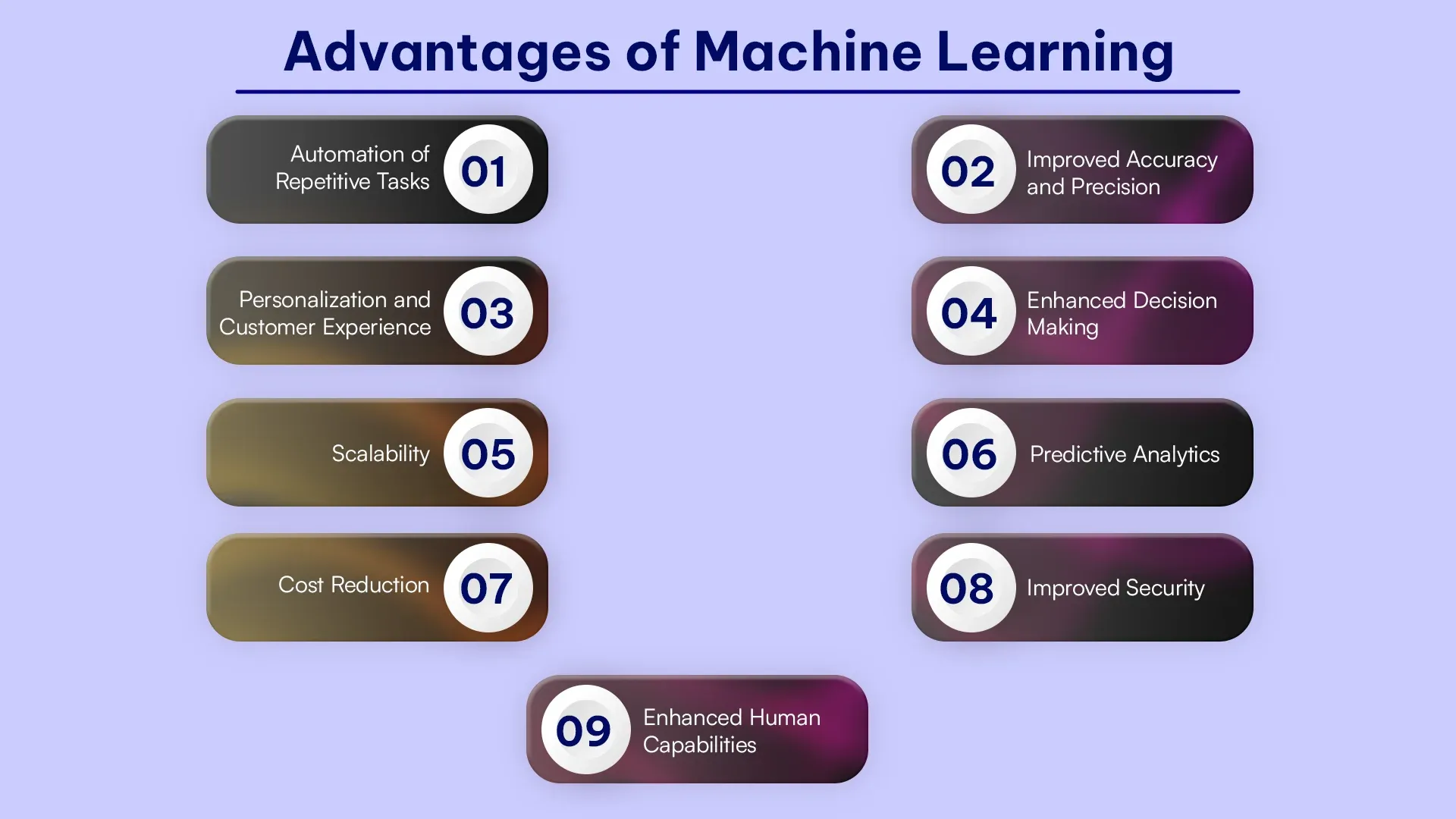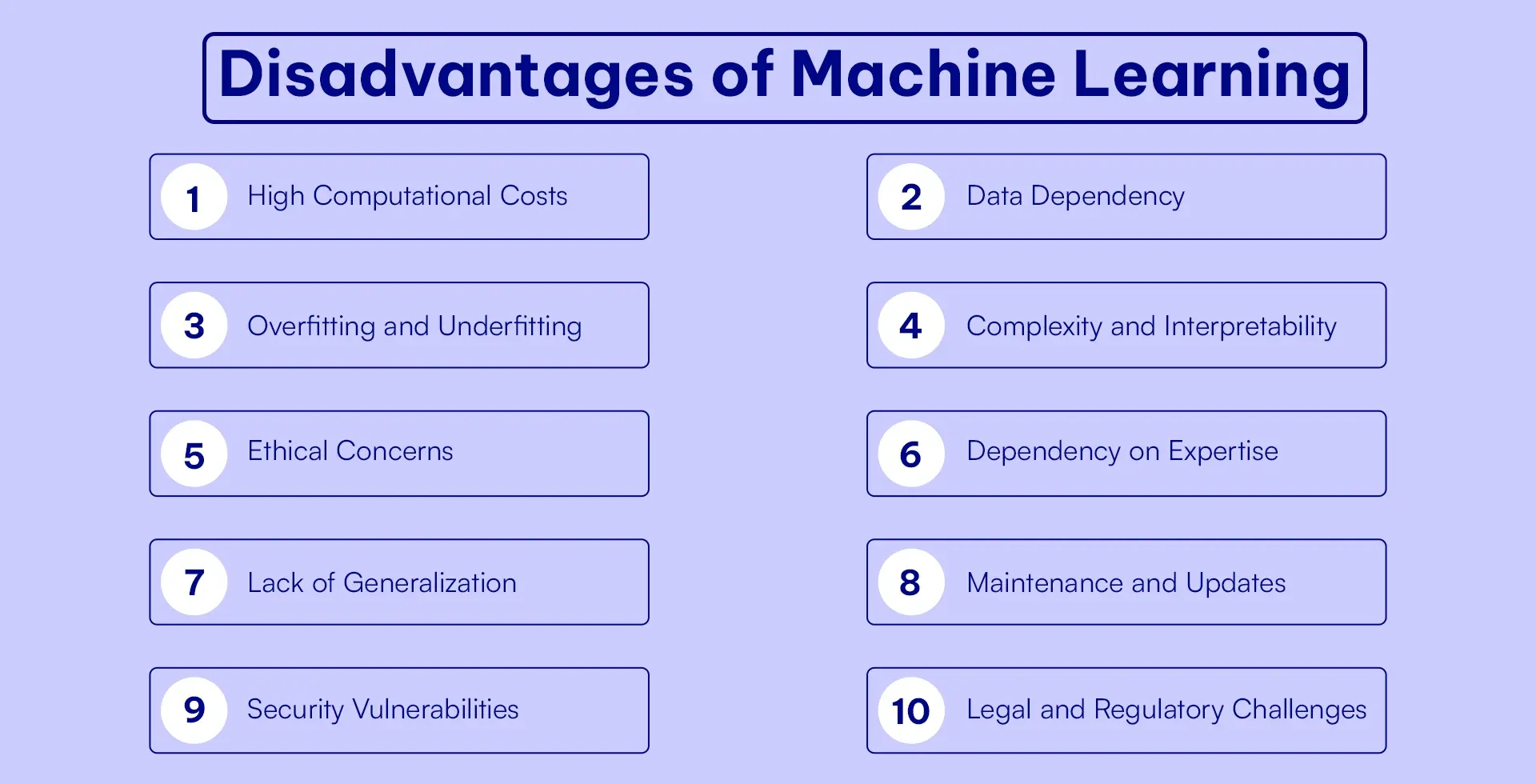
ML as a technology has revolutionized the way we live life.
You want to make decisions? Covered. Want to automate mundane tasks? Done. Knowing customer preferences? Done! Machine learning is shaping industries across the globe. With something this powerful, also comes its advantages and disadvantages. Thus, it becomes important to understand how you can consider ML for your business needs.
Let’s dive into what ML is and its various advantages and disadvantages.
Quick Summary
In this blog, we’ll be getting an idea of what machine learning is and the various advantages and disadvantages that it brings with it.
What is Machine Learning?
Machine Learning is basically artificial intelligence (AI) that allows systems to improve and adapt by learning. All using data that is fed into the system. Instead of relying on hardcoded rules, ML models analyze large datasets and then make decisions judging patterns.
For example, it’s ML that powers your YouTube playlists and your Netflix recommendations. That’s how everyday it has become in our lives.
Working Models of Machine Learning
Machine learning models operate by analyzing data to identify patterns and make predictions or decisions without explicit programming. These models fall into categories like supervised learning, where labeled data guides predictions; unsupervised learning, which uncovers hidden patterns; and reinforcement learning, where systems learn through trial and error. Each model type is tailored to solve specific problems, driving innovation across industries. Machine learning techniques are generally divided into three main categories:
1. Supervised Learning
How it Works: In supervised learning, the model is trained using labeled data, meaning the input data is paired with the correct output.
- Examples: Spam detection in emails, credit scoring, and image recognition.
- Use Case: A model is trained to recognize pictures of cats by being shown thousands of labeled cat images.
2. Unsupervised Learning
How it Works: The model is provided with data without labeled responses. It identifies patterns and relationships by clustering or reducing dimensionality.
- Examples: Customer segmentation, anomaly detection, and market basket analysis.
- Use Case: Grouping customers based on purchasing habits without predefined categories.
3. Reinforcement Learning
How it Works: The model learns by interacting with its environment and receiving feedback in the form of rewards or penalties.
- Examples: Game AI, robotics, and autonomous driving.
- Use Case: Training a robot to navigate a maze by rewarding successful moves.
Advantages of Machine Learning
Machine learning offers numerous benefits, including the ability to process and analyze vast amounts of data quickly, automate repetitive tasks, and improve decision-making accuracy. It enables predictive insights, personalized user experiences, and continuous learning from data to enhance performance over time. These advantages make ML a powerful tool for driving efficiency and innovation across industries.Yep, machine learning is a game-changer for industries. Especially those ones that look to automate processes and improve accuracy. With that in mind, here are some of the key advantages of machine learning:

1. Automation of Repetitive Tasks
ML helps automate tasks that are otherwise regarded to be repetitive and time-consuming. What this does is, that it helps free employees and brings them towards more strategic work. Freed-up energy works wonders when it comes to better utilization of resources.
2. Improved Accuracy and Precision
ML keeps improving.
Over time, the predictions keep getting better and better. Also, they have a high tendency to replace traditional statistical models. And with fields like healthcare, ML models can detect diseases earlier than human doctors as well.
3. Personalization and Customer Experience
ML is behind those personalization algorithms. It is all about the user experience nowadays, and ML makes it more customized than ever. People love being taken care of, such as suggesting movies and shows on Netflix and suggesting songs on Spotify. That’s something revolutionary right there.
4. Enhanced Decision-Making
Humans might miss data, but ML can’t. These systems analyze vast amounts of data, giving you an edge in decision-making. It helps identify patterns as it brilliantly predicts outcomes and minimizes risks.
5. Scalability
ML models scale almost too well.
With more and more data, it handles large datasets that would otherwise overwhelm traditional systems. This scalable nature allows companies to expand operations without increasing resources.
6. Predictive Analytics
Forecasting is how you stay ahead of the competition. There are trends, there are demands and there are potential problems. For example, ML can even predict equipment failures in manufacturing so that there’s lesser downtime and maintenance is way, way smoother.
7. Cost Reduction
Automation and improved efficiency is what ML brings to the table. Did we mention how much money you end up saving? Minimizing labors and reducing errors does have its advantages it seems.
8. Improved Security
Machine learning enhances cybersecurity manifold.
You get detection and threat responding in real time. ML analyzes network traffic, sniffing out any pesky elements and predicts potential breaches before they actually happen. Proactive is one of ML’s biggest strengths.
9. Enhanced Human Capabilities
ML doesn’t replace humans – it augments their abilities. Doctors use ML to diagnose diseases faster, while financial analysts leverage ML models to identify investment opportunities.
Also Read: Benefits of Machine Learning in Healthcare
Disadvantages of Machine Learning
Machine learning has challenges, including the need for large, high-quality datasets and significant computational resources. Models can be prone to bias if training data is unbalanced, and their complexity often makes them difficult to interpret. Additionally, implementing ML solutions can be costly and time-consuming, posing a barrier for smaller organizations. With its many advantages, come ML’s many disadvantages too. Revolutionary things come with their downsides too. Let’s break them up one-by-one:

1.High Computational Costs
Training ML models isn’t a piece of cake. It requires significant computational resources. Stuff like deep learning requires GPUs and cloud infrastructure, leading to an uptick in costs for small and medium-size enterprises (SMEs).
2.Data Dependency
ML models are as good as the data they’re trained on.
Poor-quality, biased or insufficient data can lead to inaccurate and flawed decisions. For this, you need proper data collection and management.
3. Overfitting and Underfitting
- Overfitting: The model learns too much from the training data, capturing noise and producing inaccurate results on new data.
- Underfitting: The model is too simple, failing to capture patterns in the data, leading to poor performance.
4. Complexity and Interpretability
With something so ground-breaking, there’s also complexity at stake. ML models and their internal workings are very complex, it then becomes challenging to understand how decisions are actually made.
5. Ethical Concerns
ML can unintentionally perpetuate biases present in the training data. For instance, biased hiring algorithms can discriminate against certain groups. Ensuring fairness and ethical use of ML is a growing concern that needs continuous oversight.
6. Dependency on Expertise
As we’ve stated earlier, deploying and developing ML models is a Himalayan endeavour. With an already existing shortage of professionals, projects have a chance of being delayed and thus have an increase in costs.
7. Lack of Generalization
ML models often excel in specific tasks but struggle to generalize to new, unseen environments. Transfer learning and continual learning techniques are needed to address this limitation.
8. Maintenance and Updates
ML models need regular updates and retraining to remain relevant. As new data becomes available, the model must adapt to changing environments. This ongoing maintenance can be resource intensive.
9. Security Vulnerabilities
ML systems are susceptible to adversarial attacks, where small manipulations to the input can deceive the model. Ensuring the robustness of ML models against such attacks is critical for secure deployments.
10. Legal and Regulatory Challenges
ML raises various legal and regulatory issues, particularly concerning data privacy, intellectual property, and accountability. Organizations must navigate complex regulations to avoid fines and legal disputes.
Conclusion
We explored various advantages and disadvantages of machine learning, learning how it can impact our lives. ML has been a promising technology, leading the wave of AI and transforming how we perceive the world and its workings.
Want to read more about how AI is making a difference in all our lives? Check out our blogs for more insights!
Looking to harness the power of machine learning for your business? Rejoicehubllp offers innovative solutions to help you take full advantage of ML's capabilities and drive your business forward. Dive into the possibilities today!
Frequently Asked Questions
1. What industries benefit most from machine learning?
Healthcare, finance, e-commerce, manufacturing, and cybersecurity.
2. Can small businesses afford to implement machine learning?
Yes, small businesses can implement ML at lower costs with cloud-based ML platforms.
